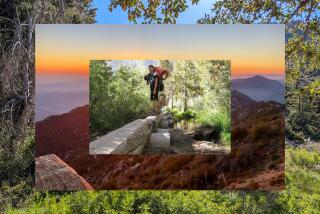The Man Behind the Camp Fund
- Share via
For a boy of 12, night duty was grand.
It was a big job, the way Milton L. Goldberg remembers it, that summer of 1925 at Lake Cuyamaca. He was a Boy Scout, and in the still of night, the troop was in his hands. He and a buddy stoked the fire, watched for the wild things in the mountains near San Diego. For a baker’s son, for a boy who had never before pitched a tent, “that,” he says, “was one of the most exciting times of my life.”
The weekend turned him into a lifelong outdoorsman--and a guru on the transformative powers of camping. Now retired in Sierra Madre, Goldberg, 86, is the founding president of the Los Angeles Times Summer Camp Fund, which kicks off its 45th year today and runs through Labor Day. He has been on the Camp Fund’s advisory committee every year since its inception in 1954.
The fund, through donations from Times readers and employees, has helped send more than 300,000 underprivileged children to camp. And the annual donor program has raised more than $21 million for Southern California campers. It started with $20,000, and a simple question.
*
In the late 1940s, Goldberg was part of a group of professional camp leaders in the Southern California Camping Assn. World War II had just ended, and organized camping was taking off as a cool way for kids to kick back--or, as the professional camp leaders put it, “an accepted antidote from the viewpoint of mental health with the pressures inflicted by our modern civilization and the atomic age.”
But the slogan of the American Camping Assn. had nagged at the group: “Camping for All.” What did that mean? Was it a true egalitarian exercise in Greater Los Angeles?
After a two-year survey and study, the group came to a troubling conclusion. Organized camping, their study showed, usually ruled out kids who were poor, ethnic minorities, at risk, or physically or emotionally disabled--and there was no coordinated effort to help them.
Goldberg didn’t need a survey to tell him that. At the time, he was executive director of the Jewish Big Brothers Assn. of Los Angeles and had helped run its summer camp. Still, the findings weighed on him.
His own days at camp, and later as a Scoutmaster, had led him to a career of social work. He never stopped climbing mountains, either, after that first time, waking up at dawn with his Scout troop to hike up to the highest peak at Lake Cuyamaca.
“That gave me the real conviction of how valuable it was, out of my own experience,” he said. “You’re in the great outdoors, you develop a sense of freedom. . . . Kids from a lower class financially were not going to camp, and that wasn’t right.”
When the camping association met to discuss the study, Goldberg was ready with his pitch. We can’t allow this to happen, he told them.
A representative from The Times was at the meeting and had an idea. A New York newspaper, he heard, had set up a fund for needy campers. Maybe The Times could start something like that.
At the next meeting, The Times agreed to kick in $10,000 for the pilot project, and the United Way agreed to match the amount. The Times Summer Camp Fund was underway.
Forty-five years later, the fund is going strong--much to Goldberg’s amazement, he said with a chuckle.
And he never stopped thinking about camping. Amazing, he said, that camping has not changed since he was a boy. You stoke the fire, you tell ghost stories, you unroll the sleeping bag. When his own kids were growing up, the family took camping vacations in the Angeles National Forest.
After retiring in 1986, Goldberg gradually eased out of his volunteer commitments, except for two: the Camp Fund and a Boy Scouts camp committee.
The fund is needed more than ever “as a counterbalance to the negative things going on in the environment,” Goldberg said.
Each year, 100% of donations go to camperships. The Times absorbs administrative costs for the fund, and Bank of America donates accounting services. An outside committee of community leaders distributes the money to youth agencies based on their size and need.
The Times does not own or operate any of the camps but allocates funds to youth agencies with camps accredited by the American Camping Assn. The agencies select kids with the greatest need--financially, emotionally or otherwise--for the program.
It costs an average of $125 to provide a child with a week’s stay at summer camp. Unless donors request otherwise, all donations of $25 or more will be included in a list that appears each Tuesday in Southern California Living.
Times staff writer Renee Tawa can be reached by e-mail at [email protected].


